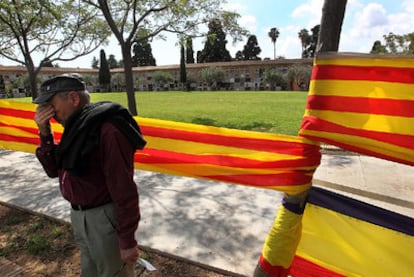Victims of Francoism fear historical memory cuts under PP government
Valley of the Fallen commission also worried over outcome in November elections
"The Historical Memory Law serves absolutely no purpose whatsoever. I have no interest at all in seeing it passed." These words were spoken by the leader of the opposition, Popular Party (PP) chief Mariano Rajoy, and if opinion polls are to be believed, the next prime minister of Spain.
Families of the victims of the Franco regime fear that if and should the PP assume the reins of government, it will apply cuts to the subsidies awarded to projects connected with historical memory, particularly the opening of mass graves from the Civil War era. Since 2006, the Socialist government of José Luis Rodríguez Zapatero has granted 20 million euros to these undertakings, 29 percent of which has gone to excavating graves.
Since 2000, 278 mass graves containing adversaries of the Nationalist army and the subsequent regime have been unearthed in Spain, from which 5,476 victims have been recovered. Fifty-one percent of the exhumations have taken place in Castilla y León, and 95 percent of the victims in Spain's mass graves were killed in extrajudicial assassinations. In all, 642 projects have been carried out under the auspices of the historical memory movement.
The commission of experts that the cabinet secretary, Ramón Jáuregi, has enlisted to examine the remodeling of the Valley of the Fallen, Franco's vast mausoleum at San Lorenzo del Escorial to the north of Madrid, are also concerned that their project will fall by the wayside if the PP wins the general elections on November 20. The commission is to submit its report in October.
"We have never seen even the slightest comprehension of this matter on the part of the PP. All we have ever heard are disparaging phrases such as 'nobody is interested in this'," says Emilio Silva, president of the Association for the Recovery of Historical Memory.
In regions governed by the PP, access to data for maps of mass graves being produced by the association has been denied. Recently, the PP mayor of Poyales del Hoyo, Ávila, decided to return nine victims of Francoist reprisals to an already excavated mass grave. "We went seven years without subsidies and if they are taken away now we will return to the previous model," says Silva. "We're stronger now; we have more experience and more human capital."
Fausto Canales, the son and nephew of two Republicans shot dead and buried at the Valley of the Fallen without family consent, agrees: "We know that the PP will try to put a stop to this [movement] by using the excuse of the economic crisis. We will be prepared to ensure that everything we have achieved over the years does not get destroyed. And if we don't achieve that, our grandchildren or great-grandchildren will, because there is no turning back now."
Francisco Etxeberria, a forensic scientist who has excavated the majority of mass graves in Spain, believes that the Socialists will support historical memory even more once in opposition. They are accustomed to facing adversity, he says, highlighting the judicial proceedings against suspended High Court Judge Baltasar Garzón, who launched an investigation into Franco-era crimes against humanity.
Last week, associations of families of the victims of reprisals by the dictatorship protested, as the trial against Garzón opened in Madrid, that Spanish judges, unlike their counterparts in other countries, refuse to investigate the forced disappearance of tens of thousands of people who opposed Franco. In Spain, that number is 113,000.

Tu suscripción se está usando en otro dispositivo
¿Quieres añadir otro usuario a tu suscripción?
Si continúas leyendo en este dispositivo, no se podrá leer en el otro.
FlechaTu suscripción se está usando en otro dispositivo y solo puedes acceder a EL PAÍS desde un dispositivo a la vez.
Si quieres compartir tu cuenta, cambia tu suscripción a la modalidad Premium, así podrás añadir otro usuario. Cada uno accederá con su propia cuenta de email, lo que os permitirá personalizar vuestra experiencia en EL PAÍS.
¿Tienes una suscripción de empresa? Accede aquí para contratar más cuentas.
En el caso de no saber quién está usando tu cuenta, te recomendamos cambiar tu contraseña aquí.
Si decides continuar compartiendo tu cuenta, este mensaje se mostrará en tu dispositivo y en el de la otra persona que está usando tu cuenta de forma indefinida, afectando a tu experiencia de lectura. Puedes consultar aquí los términos y condiciones de la suscripción digital.








































